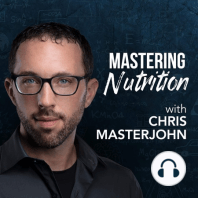27 min listen

Can you explain plant polyphenols and hormesis? | Masterjohn Q&A Files #80
Can you explain plant polyphenols and hormesis? | Masterjohn Q&A Files #80
ratings:
Length:
11 minutes
Released:
Mar 10, 2020
Format:
Podcast episode
Description
Question: Can you explain plant polyphenols and hormesis? In brief, our detoxification system didn't evolve to handle the toxins of modern society. Modern society invents a new chemical. Our body knows it's a toxin, but it doesn't know it because we were exposed to it for millions of years. It knows it because it has similarity to other toxins. That similarity may be weaker or stronger depending on the toxin. Our bodies do evolve to be bad at detoxifying. They evolve to be good at detoxifying. Our system is not designed to get sick when we encounter toxins. It's designed to get healthy when we encounter toxins. The way that works is throughout most of our evolutionary history, the toxins we were exposed to were the toxins in plants. Most of them are polyphenols. Most of them are the things that we ascribe health benefits to. A lot of those health benefits come from the fact that these are the toxins that our bodies are designed to work with. Xenobiotic defense -- xenobiotic is something foreign -- this defense system is this giant umbrella system that in a very general level assesses the likelihood of how much energy should we invest in keeping that system running based on how much toxins are we exposed to and uses that metric to invest the energy in that entire machinery. We're not investing in getting rid of a specific toxin. We're just taking the collective toxin and investing in the collective detoxification machinery, the collective antioxidant glycation-defense machinery. Because fruit and vegetable polyphenols were the major toxins, our system is designed to be very highly responsive to them, to use them as that metric. Now, in the modern society, what do we do? We invented new toxins. By the way, the fruit and vegetable polyphenols, what happens if you just take a bunch of them and you dump them on cells? You kill the cells. What happens when we eat them? Ninety-nine percent of them don't get absorbed. Why? Because the intestinal cells have a detoxification pathway that's just like the liver's. I think where you cross the line is, what you don't want to do is isolate those things into a pill and megadose them. That's why people, when they ask me about sulforaphane and milk thistle, my view of that is that that's what you do when you can't eat a high volume of unrefined plant foods with five to nine fruits and vegetables. But what you don't want to do is say, "Well, if the bottle says one capsule milk thistle a day is good for me, then ten capsules of milk thistle on top of ten servings of fruits and vegetables is good for me." Then you're in the zone of who knows what that's doing to you. This Q&A can also be found as part of a much longer episode, here: https://chrismasterjohnphd.com/podcast/2019/03/30/ask-anything-nutrition-march-4-2019 If you would like to be part of the next live Ask Me Anything About Nutrition, sign up for the CMJ Masterpass, which includes access to these live Zoom sessions, premium features on all my content, and hundreds of dollars of exclusive discounts. You can sign up with a 10% lifetime discount here: https://chrismasterjohnphd.com/q&a
Released:
Mar 10, 2020
Format:
Podcast episode
Titles in the series (100)
003: The Sugar Conspiracy -- Trading One Nutritional Boogeyman for Another: In his April 7, 2016 piece in The Guardian, "The Sugar Conspiracy" Ian Leslie argues that the politics of nutrition has blinded us to the fact that sugar is more deserving than saturated fat of the status of dietary arch-villain and that the... by Mastering Nutrition